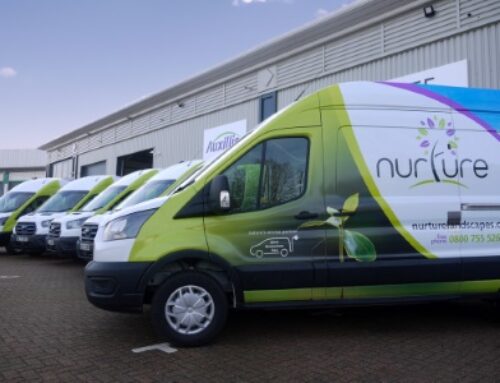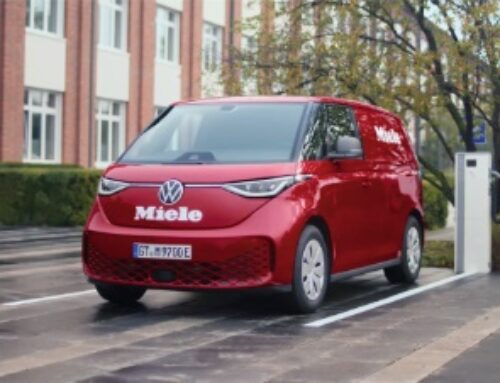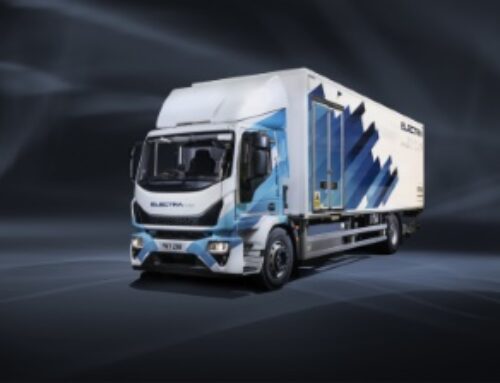BPW axles steer the way to LST compliance
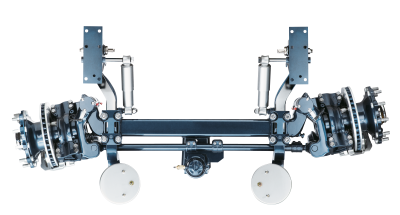 BPW’s trailer technology portfolio includes the LL Self-Steering Axle, which the company says can meet the requirements of regulations introduced last year for longer semi-trailers.
BPW’s trailer technology portfolio includes the LL Self-Steering Axle, which the company says can meet the requirements of regulations introduced last year for longer semi-trailers.
The Department of Transport (DfT) introduced legislation permitting longer semi-trailer (LSTs) combinations, with a maximum length of 18.55 metres, on roads in Great Britain – 2.05 metres longer than the standard size – in a move designed to cut emissions and further economic growth.
The introduction of LSTs was designed to facilitate the transportation of larger quantities of goods, as their increased capacities enable eight per cent fewer journeys than standard trailers.
DfT said it expected the move to generate £1.4 billion in economic benefits and take one standard-size trailer off the road for every 12 trips, contributing to enhanced logistics and environmental sustainability.
Vehicles which use LSTs are subject to the same 44-tonne gross combination weight limit as those using standard trailers. The LSTs are also expected to cause less wear on the road than conventional trailers due to the type of steering axles used.
“The move follows an 11-year trial, confirming the well-established benefits of increasing vehicle capacity: reduced costs, estimations of saving 70,000 tonnes of carbon dioxide from being released into the atmosphere and a reduced number of trailers on our roads,” said BPW.
“After an active involvement in supporting the trials, BPW welcomes the approval which demonstrates the improvement in transport efficiency that can be achieved with the right technology.”
The BPW LL Self-Steering Axle not only enables compliance with the new LST regulations, says the company, but also delivers substantial environmental and economic advantages.
“The simple passive steering components enable automatic, load dependent control,” said BPW.
“The traditional benefits of BPW’s LL self-steer axle have been well documented: these include enhanced manoeuvrability, lower fuel consumption, lower tyre costs, and reduced stress on the chassis.
“The benefits are simply achieved: BPW’s self-steering axle operates without the need for power-assisted steering control stabilisers. It is automatically controlled according to the load being carried, and because the design itself is so simple, the number of individual components required is low.
“This saves weight and reduced installation and maintenance costs.”
While conventional active and control steering axle designs require steering stabilisers powered from an external source, this is not the case with the BPW self-steering axle, explains the company.
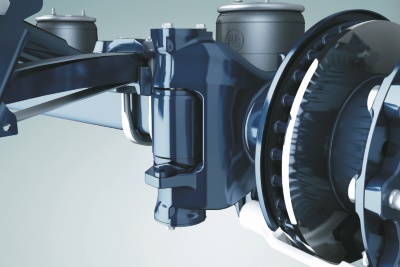 “The axle beam and axle stub are connected to corrugated thrust bearings mounted under the kingpin assemblies. When driving straight (zero position), the corrugations in the thrust washers keep the wheels on track, while the vehicle’s weight is used to keep the washers in contact providing load sensitive damping and ensuring optimal performance.”
“The axle beam and axle stub are connected to corrugated thrust bearings mounted under the kingpin assemblies. When driving straight (zero position), the corrugations in the thrust washers keep the wheels on track, while the vehicle’s weight is used to keep the washers in contact providing load sensitive damping and ensuring optimal performance.”
The firm continued: “LL stands for ‘load-dependent steering stabilisation’ and it describes the unique functional principle of the BPW self-steering axle. BPW’s LL steering axle has been designed with a self-locking facility when reversing.
“Unlike other systems, as soon as the trailer begins to move backwards, the steering mechanism is locked in the straight-ahead position. Forces acting on the tyres when cornering are distributed more evenly.
“As a result, it has been shown that the life of the tyres on the front axle increases by up to 50 per cent, while those of the rear axle can increase by as much as 70 per cent
“The LL self-steering axle shows off its strengths particularly thanks to its greater manoeuvrability on corners and when making turns, you benefit from more straightforward vehicle handling, less tyre wear and lower fuel consumption – over a distance of 100,000 kilometres that adds up to as much as 1,000 litres of fuel saving and more than four tyres per vehicles.
As part of the DfT’s regulatory regime for LSTs, operators are legally required to ensure the implementation of appropriate route plans and risk assessments that account for the trailers’ unique specifications.
Operators are also expected to conduct extra safety checks including driver training and scheduling, record keeping, training for transport managers, and proper loading practices of LSTs.
“With the ever-increasing demands placed on fleet managers, it is essential to have a solution that optimises efficiency and prioritises safety and sustainability,” said BPW.
“BPW LL self-Steering Axles provides a reliable and efficient solution, ensuring compliance with new laws governing LSTs. By incorporating these axles into their fleets, managers can optimise their operations and maximise load capacity while remaining fully compliant.
“The BPW LL self-steering axle is available with steering angles of between 12 and 27 degrees, with the latter being suited for LSTs.
“Based on the proven beneficial principles of their existing self-steer, this additional angle of steer enables allocated licence holders of 15.65-metre trailers to consider a self-steer axle, with no sacrifice of payload capability, against a more costly and heavier active or command steer system on their trailers.”








